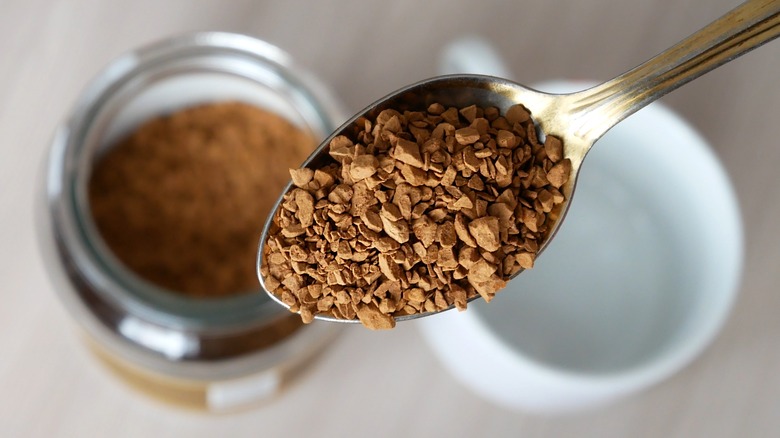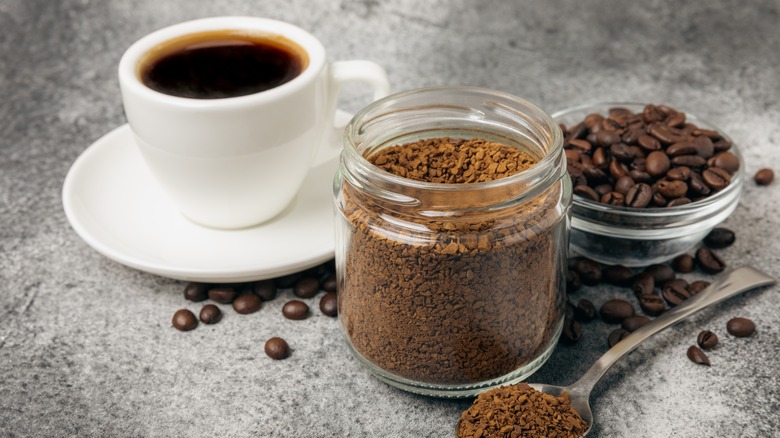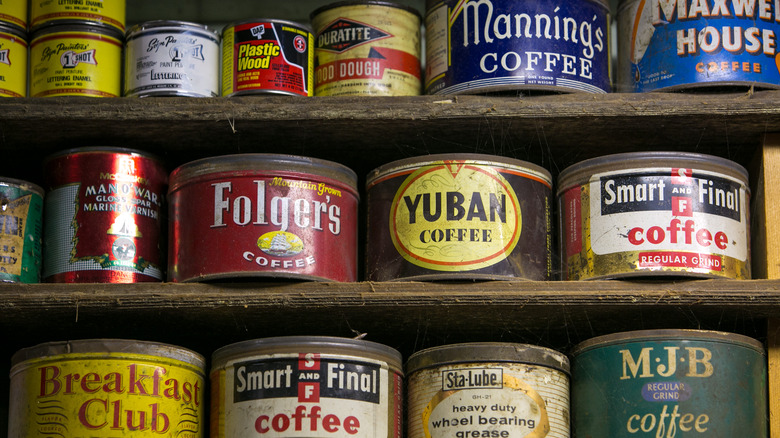You Can Thank The US Army For The Popularization Of Instant Coffee
The modern way instant coffee is made is by dehydrating brewed java into a soluble powder, a concept that sounds pretty high-tech, but the roots of this convenient product actually go back to 1771. That year, A British man named John Dring filed a patent for what he called a coffee compound: a dense paste made from roasted and ground coffee beans, butter, and suet (beef fat).
This innovation didn't garner much popularity, as traditional brews made from freshly-roasted beans reigned supreme. That is, until a later version was introduced to the U.S. Army. Up until the 1830s, an American soldier's daily rations included rum and brandy. President Andrew Jackson amended this 1832, hoping to reduce the rampant cases of drunken misconduct and accidents among the troops. For a more revitalizing (and less intoxicating) substitute, Jackson replaced the alcoholic rations with sugar and coffee beans.
For years, troops lugged around whole beans that needed to be laboriously roasted, ground, and brewed with milk. The start of the American Civil War in 1861 eventually brought about the need for a more effortless caffeine fix. At last, the army and navy looked towards instant coffee. A company called H. A. Tilden & Co. was commissioned to supply soldiers with their own version, a combination of coffee, sugar, and evaporated milk that was dehydrated into a powdered mix and dubbed George Hummel's Premium Essence of Coffee.
Instant coffee evolved after the Civil War
While instant coffee gained more traction after it became a staple in army rations, it didn't exactly get rave reviews from troops. Whether coffee spoilage, rotten milk, or the quality of water was to blame, the flavor of George Hummel's Premium Essence of Coffee was regularly compared to that of axle grease. The product was soon discontinued, but coffee remained a beloved drink for the troops and a much-needed source of comfort. In fact, historians have reported that the word "coffee" popped up more frequently in the diaries of Civil War soldiers than terms like "rifle" and "bullet."
The need for convenient, easy-to-make coffee wasn't about to go away, so inventors had to come up with a string of new developments. In 1889, New Zealand coffee mill owner David Strang filed a patent for dissolvable powdered coffee, the first of its kind. By 1901, Chicago-based Japanese chemist Satori Kato had formulated a method that removed oils from the powder, which preserved its flavor and extended its shelf life, preventing the coffee from getting stale too quickly.
However, it was famed inventor George Constant Washington who really turned the tide for instant coffee. He figured out a way to produce it on a large scale in 1910, and the First World War would begin just four years later. The army would need dehydrated coffee once more.
The First World War gave instant coffee a bigger boost
According to E.F. Holbrook (head of the coffee branch at the U.S. War Department's Subsistence Department), the German use of airborne mustard gas made it impossible for American troops to safely brew coffee the traditional way. George Constant Washington's product, G. Washington's Prepared Coffee, rose to the occasion. In fact, the army alone snapped up almost all the instant coffee that the country produced during World War I, and factories that normally produced other goods were converted into instant coffee makers to ramp up production.
Instant coffee's popularity didn't dwindle once the war ended — veterans were used to the powdered java and continued to enjoy it after returning home. Washington shifted the target audience of his coffee to the common populace, selling it with catchy and patriotic slogans. A 1914 ad brags that the product was "Supplied to the boys in the trenches because the Government wanted them to have the best. Now that it is home again, you can have the best" (via NPR).
American troops had also introduced instant coffee to their allies in Europe, thus spreading its popularity across borders. At the same time, production methods improved further, and major companies like Nestlé entered the market. Instant coffee once again became an indispensable part of army rations during the Second World War, but by then, the masses were drinking it just as often as the troops.



